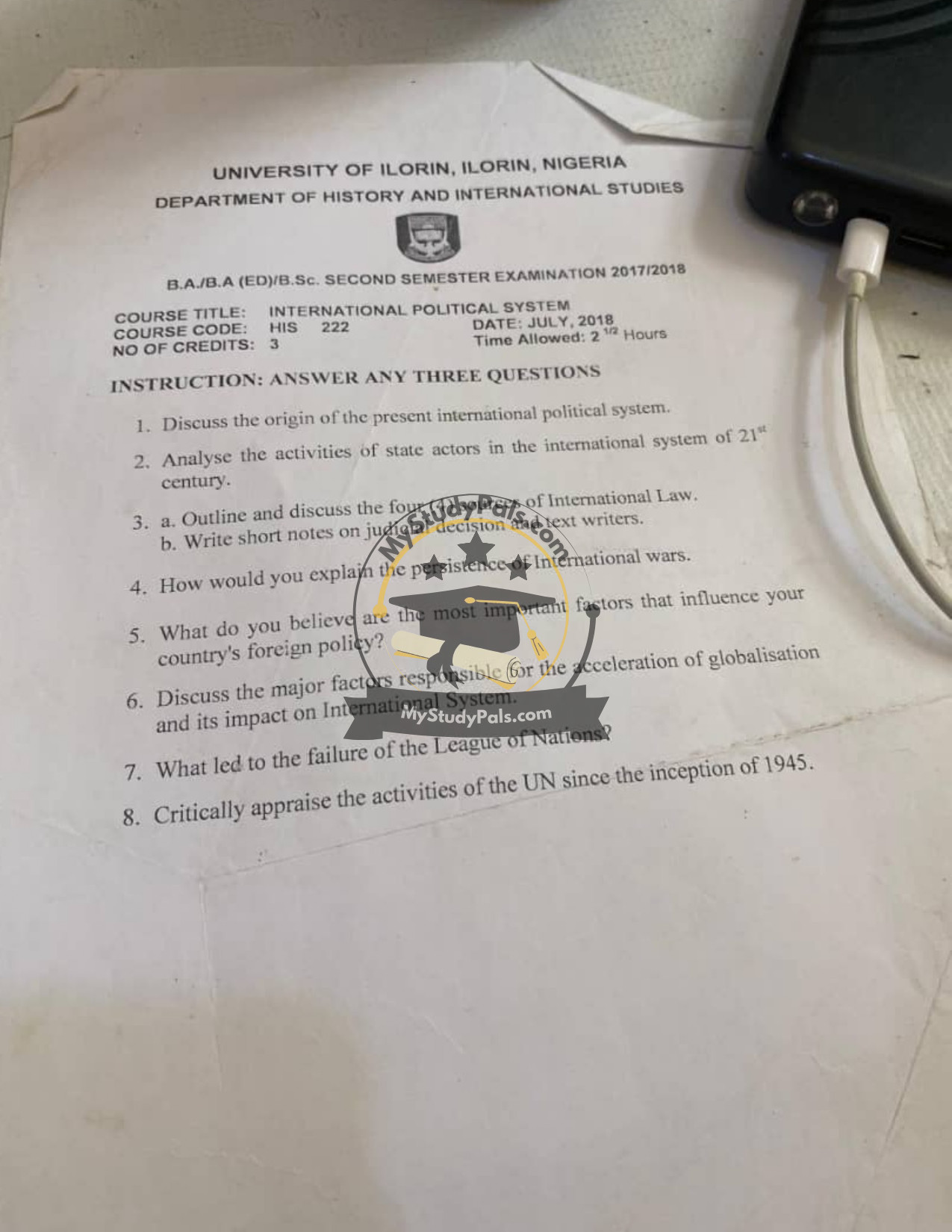ANWSER
Question 1: Discuss the origin of the present international political system.
The present international political system, often referred to as the Westphalian system, originated with the Peace of Westphalia in 1648. This treaty ended the Thirty Years’ War in Europe and established the principles of state sovereignty, territorial integrity, and non-interference in the domestic affairs of other states. Over time, this system evolved with the rise of nation-states, colonialism, and the Industrial Revolution. The 20th century saw further transformations with the creation of the League of Nations after World War I and its successor, the United Nations, after World War II. The Cold War bipolarity and the subsequent unipolar moment under U.S. hegemony also shaped the current system, which is now characterized by globalization, multilateralism, and the emergence of non-state actors.
—
Question 2: Analyse the activities of state actors in the international system of the 21st century.
In the 21st century, state actors remain central to the international system, engaging in activities such as diplomacy, economic cooperation, conflict resolution, and military interventions. Key trends include:
– Diplomacy and Alliances: States form alliances (e.g., NATO, ASEAN) and engage in multilateral forums (e.g., UN, G20) to address global challenges like climate change and terrorism.
– Economic Statecraft: States use trade agreements, sanctions, and investment strategies to exert influence (e.g., U.S.-China trade war, EU economic policies).
– Security and Conflict: States participate in peacekeeping missions (e.g., UN operations) or engage in proxy wars (e.g., Syria, Yemen).
– Technological Competition: States compete in areas like cybersecurity, AI, and space exploration (e.g., U.S., China, Russia).
– Soft Power: States leverage culture, education, and aid to enhance their global image (e.g., Japan’s cultural diplomacy, China’s Belt and Road Initiative).
—
Question 3a: Outline and discuss the four (4) sources of International Law.
The four primary sources of international law, as outlined in Article 38 of the Statute of the International Court of Justice, are:
1. International Treaties: Binding agreements between states (e.g., UN Charter, Geneva Conventions).
2. Customary International Law: Established practices accepted as law (e.g., prohibition of genocide, diplomatic immunity).
3. General Principles of Law: Common legal principles recognized by civilized nations (e.g., equity, good faith).
4. Judicial Decisions and Scholarly Works: Subsidiary sources, including rulings of international courts and writings of legal experts.
Question 3b: Write short notes on judicial decision and text writers.
– Judicial Decisions: Rulings by international courts (e.g., ICJ, ICC) and national courts contribute to the interpretation and development of international law, though they are not binding precedents.
– Text Writers: Legal scholars and jurists (e.g., Hugo Grotius) provide authoritative commentary that helps clarify and shape international legal norms.
—
Question 4: How would you explain the persistence of International wars?
International wars persist due to:
– Power Rivalries: Competition among great powers (e.g., U.S.-China tensions).
– Resource Scarcity: Conflicts over oil, water, or minerals (e.g., Sudan’s civil war).
– Ideological Differences: Clashes between political systems (e.g., Cold War proxy wars).
– Failed States: Weak governance creates vacuums exploited by warlords or terrorists (e.g., Somalia).
– Ethnic and Religious Divisions: Identity-based conflicts (e.g., Rwanda genocide, Middle East tensions).
– Arms Proliferation: Easy access to weapons fuels conflicts (e.g., Syrian Civil War).
—
Question 5: What do you believe are the most important factors that influence your country’s foreign policy?
*(Assuming Nigeria as the context)* Nigeria’s foreign policy is influenced by:
– Economic Interests: Oil exports, trade partnerships, and foreign investment needs.
– Regional Leadership: Role in ECOWAS and African Union (e.g., peacekeeping in Mali).
– Security Challenges: Combating Boko Haram and piracy in the Gulf of Guinea.
– Diaspora Concerns: Protecting citizens abroad (e.g., treatment of Nigerians in South Africa).
– Global Alliances: Balancing relations with the U.S., China, and former colonial powers.
—
Question 6: Discuss the major factors responsible for the acceleration of globalization and its impact on the International System.
Factors accelerating globalization:
– Technology: Internet, transportation, and communication advancements.
– Economic Liberalization: Free trade agreements (e.g., WTO, NAFTA).
– Multinational Corporations (MNCs): Global supply chains and investment.
– Cultural Exchange: Spread of media, languages, and lifestyles.
Impacts:
– Interdependence: States rely on each other for trade and security.
– Inequality: Wealth gaps between and within nations.
– Erosion of Sovereignty: Supranational bodies (e.g., EU, IMF) influence domestic policies.
– Transnational Challenges: Climate change, pandemics, and terrorism require global cooperation.
—
Question 7: What led to the failure of the League of Nations?
The League of Nations failed due to:
– Lack of U.S. Membership: The U.S. Senate rejected the Treaty of Versailles.
– Weak Enforcement: No military force; relied on economic sanctions.
– Great Power Absenteeism: Germany, USSR, and Japan left or were excluded.
– Unaddressed Aggression: Failed to stop Italy (Ethiopia), Japan (Manchuria), or Germany (WWII).
– Structural Flaws: Unanimity voting hindered decisive action.
—
Question 8: Critically appraise the activities of the UN since its inception in 1945.
Achievements:
– Peacekeeping: Deployed missions to Congo, Cambodia, etc.
– Human Rights: Universal Declaration of Human Rights (1948).
– Development: UNDP, WHO, and UNICEF programs.
– Decolonization: Supported independence movements.
Criticisms:
– Security Council Deadlock: Veto power misuse (e.g., Syria, Ukraine).
– Ineffectiveness in Conflicts: Failed to prevent Rwanda genocide, Srebrenica.
– Bureaucracy: Slow decision-making and inefficiency.
– Funding Issues: Dependence on member states’ contributions.
—


